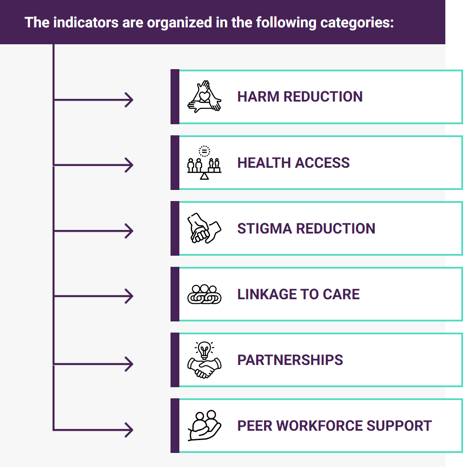You are here
Website Provides New Tool for Communities to Address Overdoses
For decades, communities across the country have been offering services and finding innovative solutions to address the U.S. drug overdose crisis, often with limited resources. Data is essential for assessing progress and measuring the impact of such efforts. By working collaboratively with shared data, public health agencies, harm reduction groups and health systems can prioritize resource allocation, understand which overdose prevention interventions are most successful and promote fair and just outcomes.
That's where Overdose Measures Matter comes in. Developed by the CDC Foundation, in consultation with a diverse set of organizations, the website features eighteen overdose prevention indicators and recommendations for their use. Represented by numbers, such as counts or percentages, or by descriptive information, these indicators provide benchmarks to identify which strategies are working. They also help practitioners track intervention outcomes, address gaps in health access and examine change over time within and across communities.
“Keeping track of outcomes gives us important information to continue applying for grants,” said one participant in Milwaukee, Wisconsin. “Seeing what other people are doing in overdose prevention and the barriers they’re experiencing and overcoming help us prepare to navigate similar circumstances.”
In addition to the indicators, the website offers background information and guidance to help community conveners, program implementers and funders identify and select which indicators are best suited to their needs and capacity.
Co-created over the past three years by engaging public health departments, community-based organizations, harm reduction groups, government agencies and health care systems, the Overdose Measures Matter website speaks to the needs of a wide range of groups. To ensure this new tool is utilized by various groups working in overdose prevention, the CDC Foundation is launching a Community of Practice, funding seven sites to develop a data action plan using select indicators from Overdose Measures Matter. These sites include:
- MKE Harm Reduction Collective (Mequon, WI)
- Metro Louisville Harm Reduction Task Force (Louisville, KY)
- Doña Ana County Health and Human Services Department (Las Cruces, NM)
- Recovery Rowan County (Morehead, KY)
- Healing Transitions (Raleigh, NC)
- Hope Council on Alcohol and Other Drug Abuse, Inc., (Kenosha, WI)
- Imperfect Village (Mount Laurel, NJ)
Through 2025, these sites will promote cross-site learning and collaboration by participating in small group discussions and webinars, and refining and implementing data collection plans tailored for their communities. In addition, they will receive support from subject matter experts from Anka Consulting and the University of Washington and participate in coaching sessions guided by peer leaders in New Jersey, Arizona, North Carolina and New Mexico with deep experience in overdose prevention data collection and analysis.
From these discussions, the CDC Foundation will learn how Overdose Measures Matter is succeeding, ensuring that more communities have access to tools and support for measuring and improving their overdose prevention response.
This project is made possible by a grant from Bloomberg Philanthropies to the CDC Foundation for the Bloomberg Overdose Prevention Initiative.

